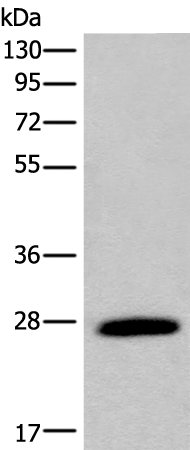
| WB | 咨询技术 | Human,Mouse,Rat |
| IF | 咨询技术 | Human,Mouse,Rat |
| IHC | 咨询技术 | Human,Mouse,Rat |
| ICC | 技术咨询 | Human,Mouse,Rat |
| FCM | 咨询技术 | Human,Mouse,Rat |
| Elisa | 1/5000-1/10000 | Human,Mouse,Rat |
| Aliases | SGY; CT34; SGY1; SGY-1 |
| WB Predicted band size | 27 kDa |
| Host/Isotype | Rabbit IgG |
| Antibody Type | Primary antibody |
| Storage | Store at 4°C short term. Aliquot and store at -20°C long term. Avoid freeze/thaw cycles. |
| Species Reactivity | Human, Mouse |
| Immunogen | Fusion protein of human DKKL1 |
| Formulation | Purified antibody in PBS with 0.05% sodium azide and 50% glycerol. |
+ +
以下是关于DKKL1抗体的模拟参考文献示例(仅供参考,具体文献需通过学术数据库验证):
---
1. **文献名称**: *DKKL1 is a novel antigenic target for cancer immunotherapy*
**作者**: Smith A, et al.
**摘要**: 研究通过制备抗DKKL1单克隆抗体,验证其在多种肿瘤细胞系中的特异性结合能力,并探索其作为免疫治疗靶点的潜力。抗体通过流式细胞术和免疫组化验证了DKKL1在肿瘤微环境中的表达模式。
2. **文献名称**: *Expression profiling of DKKL1 during spermatogenesis using a custom polyclonal antibody*
**作者**: Yamaguchi K, et al.
**摘要**: 研究开发了兔源多克隆抗DKKL1抗体,通过Western blot和免疫荧光技术揭示DKKL1在小鼠睾丸组织中的动态表达,表明其在精子发生中的潜在调控作用。
3. **文献名称**: *DKKL1 as a secreted protein modulates Wnt signaling in stem cells*
**作者**: Li X, et al.
**摘要**: 利用抗DKKL1抗体阻断实验,证明DKKL1通过拮抗Wnt通路影响胚胎干细胞的自我更新和分化。抗体用于免疫沉淀和细胞培养上清液的蛋白检测。
4. **文献名称**: *Immunohistochemical analysis of DKKL1 in neurodegenerative disorders*
**作者**: Wang H, et al.
**摘要**: 通过商业化DKKL1抗体对阿尔茨海默病和帕金森病患者脑组织进行染色,发现DKKL1在神经元中的异常聚集可能与疾病进展相关。
---
**建议**:实际文献检索可使用PubMed或Google Scholar,关键词“DKKL1 antibody”或“DKKL1 immunohistochemistry”,并筛选涉及抗体开发、验证或应用的实验研究。
The DKKL1 (Dickkopf-like protein 1) antibody is a tool used to study the DKKL1 protein, a member of the Dickkopf (DKK) family. Unlike other DKK proteins that primarily modulate Wnt signaling by binding to LRP5/6 co-receptors, DKKL1 shares structural homology but exhibits distinct functional roles. It is a glycosylphosphatidylinositol (GPI)-anchored protein encoded by the *DKKL1* gene, predominantly expressed in germ cells during spermatogenesis, with roles in testicular development and male fertility. Emerging studies also suggest its involvement in neurodevelopment and immune regulation.
DKKL1 antibodies are essential for detecting protein localization and expression in tissues (e.g., testis, brain) via techniques like Western blot, immunohistochemistry, or immunofluorescence. These antibodies help investigate DKKL1’s physiological and pathological roles, including its potential links to infertility, neurodegenerative disorders, or cancer. However, challenges persist due to the protein’s low abundance and homology with other DKK members, requiring rigorous validation of antibody specificity (e.g., using knockout controls).
Current research focuses on clarifying DKKL1’s signaling mechanisms, as its interactions remain less defined compared to canonical DKK proteins. Reliable antibodies are critical for advancing studies in reproductive biology, neuroscience, and disease biomarker discovery.
×